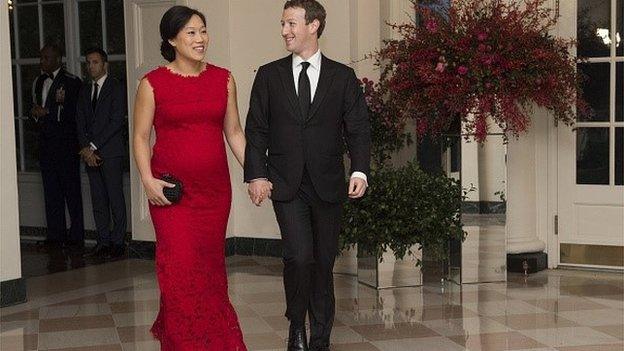What’s the best way for Zuckerberg to give away his billions?
- Published
- comments

Here's a test. You are outside a burning building and are told that inside one room is a child and inside another is a painting by Picasso.
You can save one of them. To do the most good, which do you choose?
The child, of course, you are a human being.
William MacAskill, associate professor in philosophy at Oxford University and author of Doing Good Better, would beg to differ.
He argues it would be perfectly "good" to save the Picasso, sell it, and use the money to buy anti-malarial nets in Africa - thereby saving, he argues, far more lives than the one child in the burning building.
Earlier this week, I chaired an event with Mr MacAskill organised by Intelligence Squared.
It was about the organisation Mr MacAskill co-founded - the effective altruism movement. More than 600 people paid up to £30-a-head to hear him speak. The large auditorium in central London was sold out and an over-flow balcony had to be opened.
When I read about Mark Zuckerberg's decision with his wife, Priscilla Chan, to give away $45bn (£30bn) I wondered if the Facebook founder had read Mr MacAskill's book.
Particularly given that previous generous donations Mr Zuckerberg had made had not been unalloyed successes., external
The arguments of the effective altruism movement are simple. And many of them are controversial.
People tend to give to charities - it says - with little thought about whether the money is actually well spent.
And given that people in Britain donate over £10bn a year, that matters.
Consumers tend to take more time researching online where to go for dinner or on holiday than they do where to place a charitable donation.
In a world awash with increasing amounts of data, that is not very smart.
'Effective altruism'
Mr MacAskill argues that if everyone took a little more time to think and research, efforts to alleviate extreme poverty, for example, would be far more effective.
Looking at the data, the effective altruism movement suggests, brings us to some pretty startling conclusions.
Here are a few.
First, buying from clothing companies that are supplied by sweatshops is not a bad thing.
Because in very poor countries sweatshops (despite the appalling conditions) are a much better employer, and therefore route out of poverty, than the alternatives (such as rooting through landfill sites).
Second, giving to high-profile disaster relief is rarely the most effective way to help as the amount of giving tends to be governed by the level of media coverage a disaster receives rather than a rational analysis of what the needs of the country are.
Third, it is better to give to an effective charity in the developing world than it is to a cancer charity in the developed world, as it will have a far greater effect on far more people.
Fourth, buying Fairtrade has "disappointingly little" beneficial effect for poor farmers, Mr MacAskill argues.
He says Fairtrade involves a lot of middlemen - which takes out value - and can favour richer nations such as Costa Rica and Mexico rather than poorer nations such as Ethiopia (which tend not to have the infrastructure necessary to meet Fairtrade standards).
You can read Fairtrade's response to that argument here, external.
Fifth, the average charity - by which Mr MacAskill means those that do little to show how much impact the projects they support actually have - are 100 times less effective than the best charities.
Sixth, it could well be effectively better to become a very rich banker and give away your money than go and work for an NGO in Kenya.
'Treasure what is measured'
Many people disagree with Mr MacAskill, arguing that his data-led approach underplays the role of human emotion in charitable giving, which may be irrational but motivates a large proportion of what people donate.
If charitable giving feels like "homework", the overall levels of giving will fall.
Effective altruism can also have a tendency to "treasure what is measured", thereby leaving out vast areas of positive work and underplaying the notion of "human good" (planting a tree in a disadvantaged neighbourhood) over "economic good".
His view also tends to favour the international (poverty alleviation in Africa) over the local (giving to a hospice where your mother died).
Interestingly, I did a straw poll of the audience at the end of the Intelligence Squared debate, the majority of whom had already said they donate at least once a month to charity.
I asked how many had changed their mind on how to approach charitable giving after listening to Mr MacAskill.
I would estimate that at least half put their hands up.